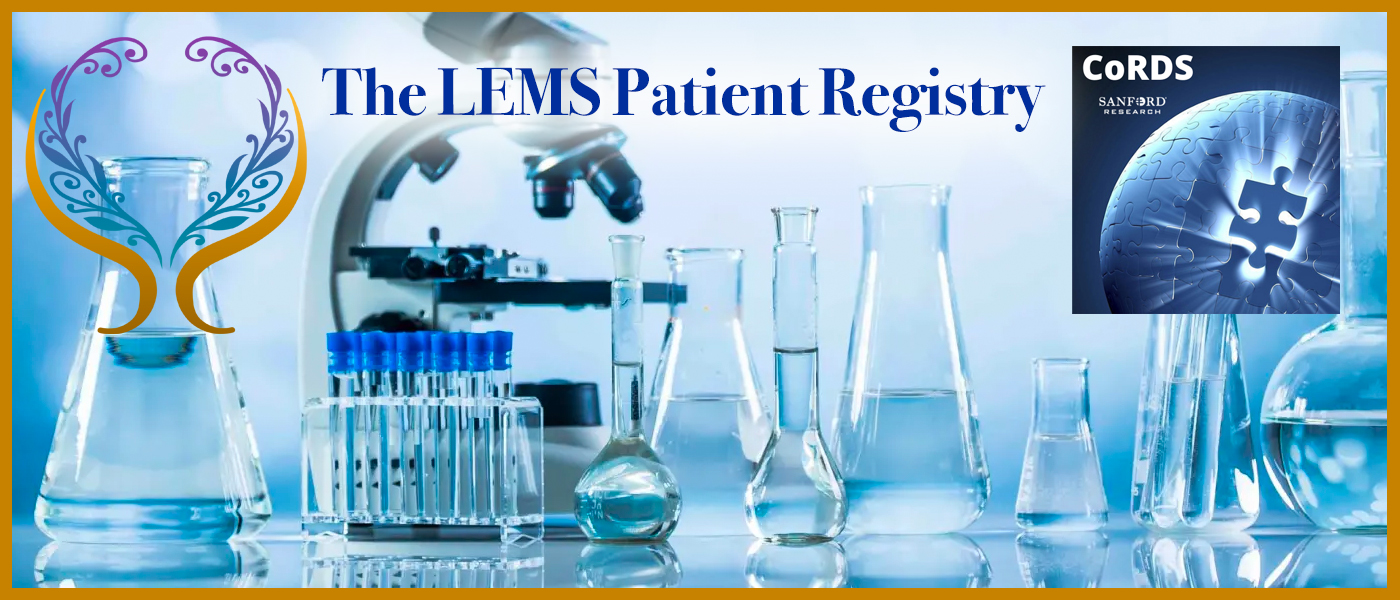The LEMS Patient Registry

Add Your LEMS History to the Registry!
The Lambert-Eaton LEMS Family Association
LEMS Patient Registry
Help us bring patients, families, and researchers together to gain a better understanding of Lambert-Eaton Myasthenic Syndrome (LEMS).
If you or a family member has been diagnosed with Lambert-Eaton, please enroll in the patient registry to make an important contribution to LEMS research. This registry collects information from people with the autoimmune, sometimes paraneoplastic syndrome, caused LEMS, to improve our understanding of the condition and encourage earlier diagnosis and more effective treatments.
The Lambert-Eaton LEMS Family Association is partnering with Sanford CoRDS to create the registry. Sanford CoRDS supports and enables rare disease communities to build robust registries, providing researchers with the information they need to drive research forward. This is a major mission goal of The Lambert-Eaton LEMS Family Association.
How does the Registry work?
- Each participant is assigned a Global Unique Identifier that enables de-identification of the data when shared with approved researchers to protect the patient's privacy. This means that your name and other identifying information will not be passed on.
- The de-identified data will be shared only with researchers approved by Sanford's Scientific Advisory Board (SAB).
- The registry is compliant with the European Union General Data Protection Regulation (GDPR).
- Importantly, the participant owns his/her personal data and can withdraw the data from the registry at any time.
- There is no cost to the participants.
- Providing your consent to The Lambert-Eaton LEMS Family Association to have access to the data you provide will allow us to better understand LEMS, help us understand where to drive our research initiatives, and let us know how patients need more support.
- Each participant is assigned a Global Unique Identifier that enables de-identification of the data when shared with approved researchers to protect the patient’s privacy. This means that your name and other identifying information will not be passed on.
- The de-identified data will be shared only with researchers approved by Sanford’s Scientific Advisory Board (SAB).
- The registry is compliant with the European Union General Data Protection Regulation (GDPR).
- Importantly, the participant owns his/her personal data and can withdraw the data from the registry at any time.
- There is no cost to the participants.
- Providing your consent to The Lambert-Eaton LEMS Family Association to have access to the data you provide will allow us to better understand LEMS, help us understand where to drive our research initiatives, and let us know how patients need more support.
Why participate?
In one word, PROGRESS. Having a registry specifically for individuals with Lambert-Eaton allows approved researchers to have easy access to useful medical data on many individuals with LEMS. Since we will have already collected this data and obtained your consent to share it, researchers can begin to develop better studies much more quickly, and more easily find participants for these studies.
Internet polls, questionnaires, and surveys are often used to collect information quickly and easily from respondents. However, to publish their results, researchers must only use information obtained in a specific way. The patient data they use must have written approval from patients to use their data this way and must adhere to strict privacy regulations. The registry is compliant with the European Union General Data Protection Regulation (GDPR). CoRDS has worked hard to ensure that researchers can use the information you provide.
CoRDS submits every questionnaire to their Institutional Review Board approval. The IRB is group that reviews the ethics of medical research studies.
Informed consent also safeguards participant data. When registering to participate in CoRDS, participants (or their representatives) are given a chance to read the consent documentation before filling out the questionnaire. For any questions, participants can call CoRDS at + 1 877 658 9192 or send an email cords@sanfordhealth.org.
If researchers receive approval to look at the registry or questionnaire responses, they will be given only the anonymous data without the identifiable information. The Lambert-Eaton LEMS Family Association can only access your identifiable information if you choose to share it with us when you complete your registry questionnaire.
Your privacy is also protected even if you indicate that you are willing to be contacted for additional research. For example, a researcher might contact CoRDS to ask for additional information from all participants who have a specific symptom, such as loss of hearing. CoRDs would then contact every participant in the registry who said that they had loss of hearing and that they would like to participate in additional studies. CoRDS would then provide these people with the researcher’s contact information, and it would be up to the individual participants to contact the researcher to participate in additional research. CoRDS will never provide your contact information to anyone.
Researchers will be able to compare your answers with those of others. The researchers will then be able to detect patterns, identify common symptoms and gain insights into effective and ineffective treatments. Your answers will provide a better overall understanding of LEMS and how the disease develops/progresses over the course of a lifetime.
Our goal is to collect and provide valuable information and to speed up research studies of Lambert-Eaton Myasthenic Syndrome and help start clinical trials for treatments.
The information you provide to this registry can help to:
- Drive research towards better treatments and possibly a cure Allow healthcare professionals and researchers to learn more about the disease
- Create a strong patient and research community
- Enhance treatment guidelines for patients to improve quality and management of care
